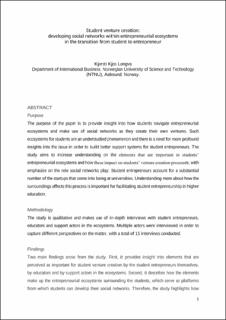| dc.contributor.author | Longva, Kjersti Kjos | |
| dc.date.accessioned | 2021-09-21T06:39:08Z | |
| dc.date.available | 2021-09-21T06:39:08Z | |
| dc.date.created | 2021-06-24T21:59:46Z | |
| dc.date.issued | 2021 | |
| dc.identifier.citation | International Journal of Entrepreneurial Behaviour & Research. 2021, 27 (5), 1264-1284. | en_US |
| dc.identifier.issn | 1355-2554 | |
| dc.identifier.uri | https://hdl.handle.net/11250/2779707 | |
| dc.description.abstract | Purpose
The purpose of the paper is to provide insight into how students navigate entrepreneurial ecosystems and make use of social networks as they create their own ventures. Such ecosystems for students are an understudied phenomenon and there is a need for more profound insights into the issue in order to build better support systems for student entrepreneurs. The study aims to increase understanding on the elements that are important in students' entrepreneurial ecosystems and how these impact on students' venture creation processes, with emphasize on the role social networks play. Student entrepreneurs account for a substantial number of the startups that come into being at universities. Understanding more about how the surroundings affects this process is important for facilitating student entrepreneurship in higher education.
Design/methodology/approach
The study is qualitative and makes use of in-depth interviews with student entrepreneurs, educators and support actors in the ecosystems. Multiple actors were interviewed in order to capture different perspectives on the matter, with a total of 15 interviews conducted.
Findings
Two main findings arose from the study. First, it provides insight into elements that are perceived as important for student venture creation by the student entrepreneurs themselves, by educators and by support actors in the ecosystems. Second, it describes how the elements make up the entrepreneurial ecosystems surrounding the students, which serve as platforms from which students can develop their social networks. Therefore, the study highlights how such ecosystems can serve as sources from which students can gain access to ideas, resources and identity processes.
Research limitations/implications
A limitation of the study is that the interviews took place in one country. Consequently, further investigation is necessary to establish whether the findings are valid in other contexts. The research has implications for higher educational institutions, policymakers and researchers concerned with student entrepreneurship and student venture creation.
Originality/value
The study contributes empirical findings on a topic that is currently not well understood and on which there are few empirical studies. While student ventures represent a substantial proportion of university spin-offs, the topic has received little attention compared to research on academic entrepreneurship. The study represents a step towards enhancing understanding of students' entrepreneurial ecosystems and how students gain access to resources through social network ties within these systems. | en_US |
| dc.language.iso | eng | en_US |
| dc.publisher | Emerald | en_US |
| dc.title | Student venture creation: developing social networks within entrepreneurial ecosystems in the transition from student to entrepreneur | en_US |
| dc.type | Peer reviewed | en_US |
| dc.type | Journal article | en_US |
| dc.description.version | acceptedVersion | en_US |
| dc.rights.holder | © Emerald Publishing Limited. This AAM is provided for your own personal use only. It may not be used for resale, reprinting, systematic distribution, emailing, or for any other commercial purpose without the permission of the publisher | en_US |
| dc.source.pagenumber | 1264-1284 | en_US |
| dc.source.volume | 27 | en_US |
| dc.source.journal | International Journal of Entrepreneurial Behaviour & Research | en_US |
| dc.source.issue | 5 | en_US |
| dc.identifier.doi | 10.1108/IJEBR-09-2020-0661 | |
| dc.identifier.cristin | 1918325 | |
| cristin.ispublished | true | |
| cristin.fulltext | postprint | |
| cristin.qualitycode | 1 | |
